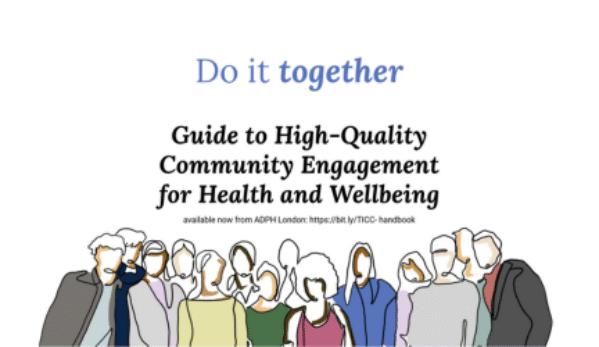
Handbook on How to Transform Community Collaboration Launches

During the COVID-19 pandemic, community collaboration, led by local community champions, saw a surge in interest, focus and funding that quickly transformed into positive collective action, fostering a sense of support and solidarity. Lessons learned have led to renewed commitment to effective community engagement to the extent that it is implicit within the three pillars of NHS 10-year plan and wider priorities. So, if everyone is agreed that effective community collaboration is key to achieving health equity and addressing health inequalities, why isn’t it happening more, and at scale? A new handbook, commissioned by ADPH London’s Community Champions Development Programme aims to answer this and provide pointers for how to respond.
Since 2021, OHID, UKSHA (then Public Health England), GLA, London Councils and ADPH London have jointly sponsored the London Community Champions Development Programme (CCDP), bringing together Champions co-ordinators from across the city to learn from and support each other, develop practice and help drive successful implementation of London public health priorities.
In 2023 Transformations in Community Collaboration I: Lessons from Covid Champions progammes across London was published, capturing case studies across London. This new handbook builds on that.
The initial literature review revealed a multitude of publications on what good community collaboration looks like and how to do it well, with more than 300 resources in existence. Community-centred approaches are being discussed in all the right places and yet, there is growing frustration from communities and colleagues that practice does not meet ambition.
The project then pivoted to ask; If there is so much awareness, attention and commitment why does community-centred work not happen at scale and sustainably?
The subsequent research, including in-depth interviews with practitioners and leaders in London and nationally, concludes that community-centred approaches can be impeded by different types of fear, avoidance, concern and nervousness that lead to institutional inertia and prevent scale.
The core findings have been captured in a ground breaking handbook providing practical steps and shared insights, making it a valuable resource for anyone involved in shaping or implementing community engagement strategies.
This guide is written for people in the NHS, public health, local government, and other institutions who are working to prevent poor health and wellbeing, reduce health and wellbeing inequities, and improve outcomes.
Professor Kevin Fenton CBE, Regional Director, OHID London, Regional Director of Public Health, NHS London said:
Collaboration with communities is core to improving health and wellbeing for all Londoners. Yet community collaboration does not yet happen at scale or sustainably. This handbook asks why – given the evidence base for how powerful collaboration can be. It provides practical ways that people at all level within health and care systems can move from rhetoric to reality and how we can take all of the lessons that we have on what good looks like and put them into practice. I view this as essential reading for anyone involved in shaping or implementing community engagement strategies.
Dr Will Maimaris, Co Chair of ADPH London and Director of Public Health, London Borough of Haringey said:
The handbook calls on us to get out of our comfort zone and work in new ways that might be uncomfortable and challenging but ultimately help create the relationships and partnerships needed to improve health equity and health outcomes.
Dr Janet Djomba, Community Engagement Lead at ADPH London and Director of Public Health, London Borough of Barnet said:
This handbook is an important resource for anyone working in public health and beyond to continue evolving how we work collaboratively with communities. The Handbook makes a valuable contribution to this work and to the wider ambitions we all have across London to work with communities to achieve better health outcomes for all.
Links to Resources:
Transformations in Community Collaboration II:: https://bit.ly/TICC-handbook
Transformations in Community Collaboration II: Resource Library for High-Quality Community Engagement for Health and Wellbeing: https://bit.ly/TICC-resources
Transformation in Community Collaboration Handbook – Summary Slides: https://bit.ly/TICC-Slides